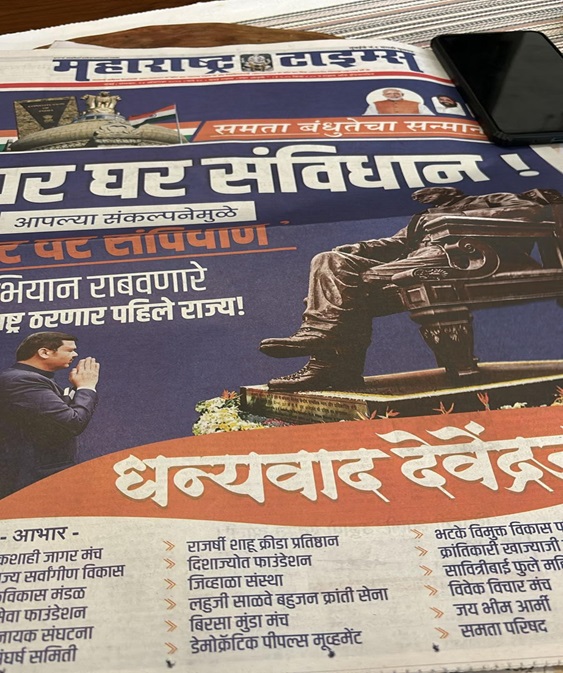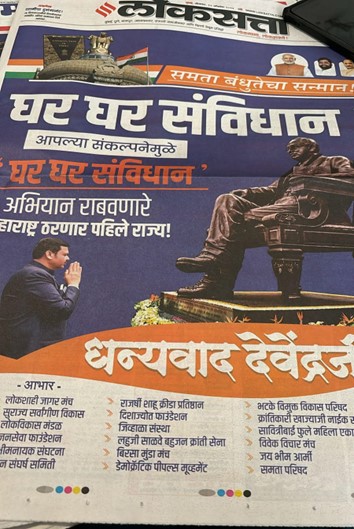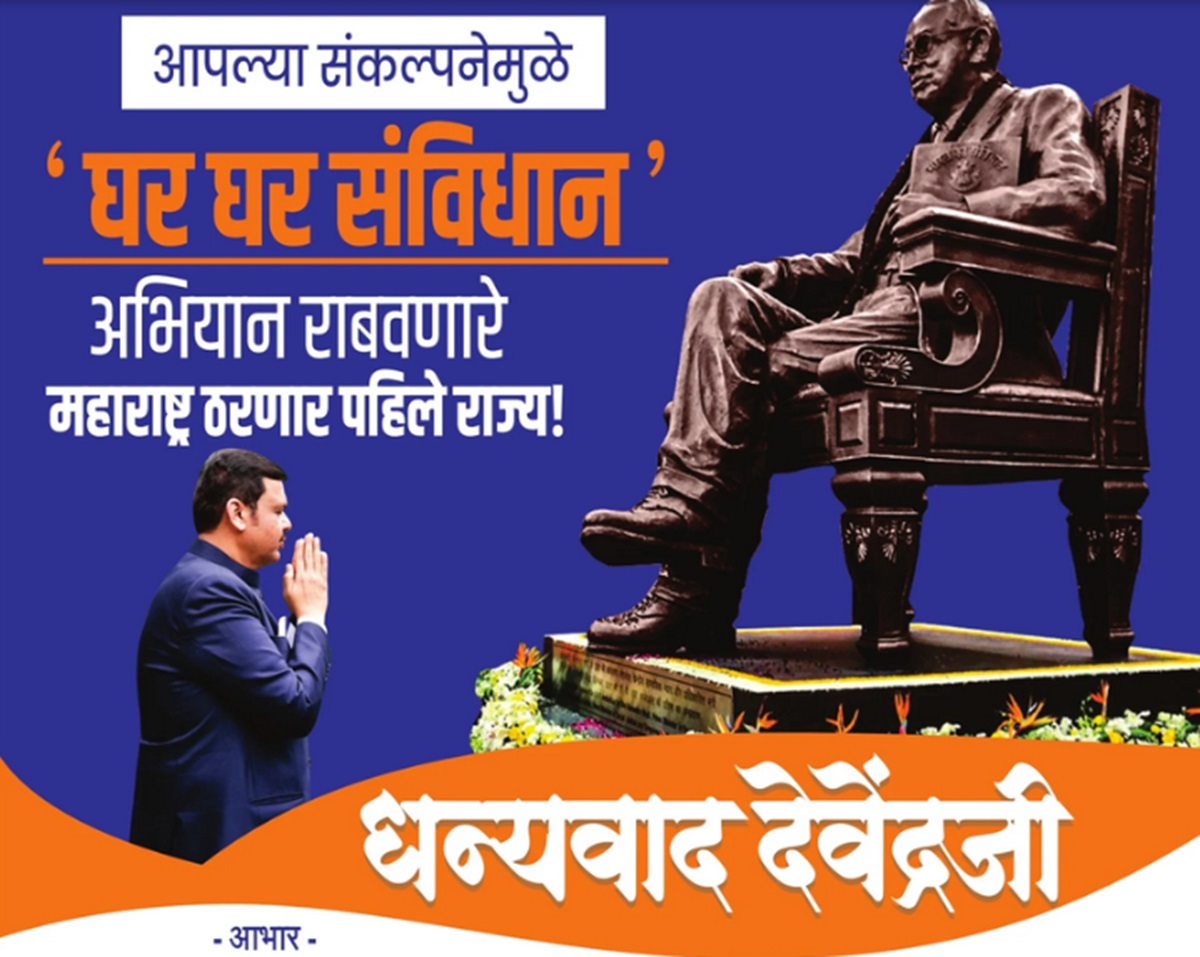As the state of Maharashtra braces for its upcoming state elections, the date of which are yet to be announced, the Eknath Shinde-led government has seemingly gone into overdrive with a flurry of government orders and a blitz of full-page advertisements in prominent Marathi newspapers like Maharashtra Times and Lok Satta. Adopting the #SaveConstitution slogan that was the clarion call of the INDIA Alliance during the Lok Sabha Polls (April_June 2024), are today today’s advertisement featuring a prostrating Maharashtra Deputy Chief Minister Devendra Fadnavis, promoting the “Ghar Ghar Sambhavidhan” initiative—a campaign that leverages the legacy of Dr. B.R. Ambedkar. On the surface, this campaign claims to bring the values of the Constitution to every household, but the timing, messaging, and cost of these efforts suggest otherwise: a pre-election gimmick aimed at swaying voters. The backbone of the Bharatiya Janata Party (BJP), the Rashtriya Swayamsevak Sangh is no fan of either Dr BR Ambedkar or the Constitution though –given his unshakeable hold on India’s people—they have appropriated a hollowed out version of the towering giant!


The irony of the Mahayuti government now championing the Constitution through campaigns like “Ghar Ghar Sambhavidhan” is glaring, especially given its own troubling history of undermining constitutional principles. From the very moment of its formation, the government has been marred by constitutional controversies. The Eknath Shinde-led coalition itself came into existence after a dramatic political coup, where defecting legislators bypassed democratic norms, raising serious questions about constitutional propriety. This was followed by a series of actions that further eroded constitutional values—ranging from bulldozer politics that disregarded due process to systematic attacks on dissent, and the selective targeting of marginalised communities. After repeatedly trampling upon the very ethos of the Constitution, it is deeply ironic, and indeed cynical, for this government to now promote itself as a defender of constitutional values. This sudden embrace of constitutional imagery in the run-up to the elections seems more like a strategic ploy to reclaim lost moral ground rather than a genuine commitment to safeguarding the foundational document of Indian democracy.
The expensive price tag of political propaganda
Before we dive into the irony of the advertisement, it is essential to point towards the financial cost of these advertisements, estimated to be upwards of ₹15–25 lakh for full-page placements in high-circulation dailies like Maharashtra Times and Lok Satta, is substantial. For perspective, multiple full-page ads in these leading publications over several days could cost the government crores of rupees. This expenditure begs the question: Why is the state splurging on image-building campaigns when Maharashtra faces urgent fiscal challenges? While these advertisements are a clear attempt to boost the image of the Mahayuti government ahead of elections, what’s often overlooked is who’s footing the bill for this political propaganda: it’s the taxpayer. Public funds—our taxes—are being used to pay for these ads that serve little more than to bolster the political capital of the ruling government.
Maharashtra’s public sector continues to grapple with a host of issues—rural healthcare infrastructure is overstretched, drought-hit farmers continue to demand support, and unemployment rates are rising. Despite these pressing needs, state funds are being diverted toward political advertising, and not just any advertising, but a clear attempt to consolidate votes before the election code of conduct is enforced. The misuse of public money for electioneering feels particularly egregious. Instead of being channelled into improving healthcare, education, or providing meaningful support to drought-affected farmers, taxpayer money is being diverted toward high-cost political advertisements. This blatant misuse of public resources for partisan gain not only raises ethical concerns but also underscores a government that prioritises its electoral fortunes over the actual needs of its citizens.
Take for instance the advertisement featuring Devendra Fadnavis himself. Prominently featuring Dr. B.R. Ambedkar’s image, it seeks to position the coalition of Shiv Sena (Shinde faction), National Congress Party (Ajit Pawar faction) and Bharatiya Janata Party (BJP) as the protector of constitutional values. However, behind the façade lies a government that has, on multiple occasions, shown contempt for the Constitution’s core principles of equality, justice, and fraternity.
The misuse of Ambedkar’s legacy
Dr. B.R. Ambedkar is a figure synonymous with the Indian Constitution, but his image has often, more so in the recent times, been co-opted by political parties for electoral gain. The “Ghar Ghar Sambhavidhan” campaign is an example of this strategic co-optation. At a time when Dalits and those marginalised communities continue to face violence, discrimination, and exploitation, invoking Ambedkar’s legacy without addressing the core issues affecting these communities is an exercise in tokenism.
Dr. B.R. Ambedkar’s life was dedicated to dismantling the oppressive caste system and fighting for the rights of Dalits and other marginalised communities. However, the Mahayuti government’s invocation of Ambedkar’s image through campaigns like “Ghar Ghar Sambhavidhan” rings hollow when juxtaposed with the escalating violence, discrimination, and land-related exploitation faced by Dalits and Adivasis in Maharashtra. While Ambedkar’s face is splashed across newspaper ads, Maharashtra’s Dalit and Adivasi communities continue to bear the brunt of systematic oppression and neglect under the very government that claims to uphold his ideals.
In March 2020, a brutal case of atrocity against Dalit women had surfaced from Solapur district, wherein a 16-year-old Dalit girl had been gang-raped by 10 men for more than 6 months, underscoring the stark reality of caste-based sexual violence in Maharashtra. The girl’s family faced immense pressure from the perpetrators to withdraw the complaint, while local authorities delayed taking action, sparking protests and demonstrations demanding justice. In August 2023, in Satara, Maharashtra, a Dalit woman had faced public humiliation and assault. Her only “crime” was daring to demand the return of money she was reportedly owed. These cases mirror the growing epidemic of violence against Dalit women in the state, where crimes of rape, assault, and social ostracisation are disturbingly frequent.
In November 2023, on Maharashtra’s Beed, a Tribal woman had been stripped naked by tearing her clothes, molested and beaten for land disputes. The heinous crime had been committed in the presence of police, and those involved included a BJP MLA Suresh Dhas’s wife along with three people.
In October 2023, four Dalit children had been hung from a tree upside down and thrashed for “stealing goats and pigeons” in Srirampur in Ahmednagar district. This deep-rooted casteism is a direct affront to Ambedkar’s fight for land and economic equality, yet the state government has been silent in addressing these ongoing attacks.
Furthermore, across rural Maharashtra, Dalit farmers are facing increasing threats of land grabbing, forced evictions, and illegal occupation of their agricultural lands. As many as 81% of Dalit farmers in Maharashtra were agricultural labourers, who had no land of their own and worked on others’ farmland as opposed to 49% of landless farmers among non-Dalits, according to Census 2011. Even today, in many cases, state authorities turn a blind eye to these atrocities, failing to protect Dalit farmers’ rights to land and livelihood.
The displacement of Adivasi communities has also surged in recent years. A notable case occurred in the tribal regions of Palghar and Nashik in 2020, where Adivasis were forcibly evicted from their lands to make way for government infrastructure projects. These land grabs were carried out without proper compensation or resettlement, leaving entire communities destitute and without basic means of survival. Adivasis, who have historically been among the most marginalised groups in Indian society, find themselves repeatedly deprived of their constitutional right to land, despite the government’s public commitment to protecting the Constitution.
In Gadchiroli, in 2023, another alarming incident saw forest rights activists, including Adivasi leaders, beaten and detained for protesting the illegal encroachment of their forest lands by private contractors. This blatant disregard for the Forest Rights Act, which guarantees land rights to indigenous communities, reflects the deepening crisis in Maharashtra’s tribal belts. Dr. Ambedkar’s legacy, which emphasised the protection of marginalised communities and their access to land, is being blatantly violated by the state’s development policies, often at the behest of private industrial interests.
Another case that highlights caste violence occurred in February 2022, when a Dalit family in Latur district was attacked and boycotted for entering a local temple. The upper-caste mob severely beat the family members, accusing them of “defiling” the temple, a throwback to the deeply entrenched untouchability practices Ambedkar fought against. Even in September 2024, a Shiv Sena leader, purportedly a close aide of Maharashtra CM Eknath Shinde, had been booked along with several others for allegedly preventing Dalits from entering a temple. The local police initially refused to register a case, demonstrating how institutionalised caste bias continues to deprive Dalits of their basic rights, even in modern Maharashtra.
The grim reality for Maharashtra’s Dalits and Adivasis stands in stark contrast to the Mahayuti government’s public posture of honouring Ambedkar’s legacy. While the government spends crores on advertisements featuring Ambedkar’s image, the very communities he sought to uplift are being left vulnerable to exploitation, violence, and systemic marginalisation. The deliberate use of Ambedkar’s legacy in electoral campaigns without addressing the state’s failing record on Dalit and Adivasi rights reflects a cynical and opportunistic politics—one that exploits historical symbols for short-term political gain while ignoring the lived realities of the most oppressed sections of society. In this light, the state’s public campaigns appear less as a genuine commitment to constitutional principles and more as a cynical attempt to secure votes from marginalised communities ahead of elections.
Maharashtra, like other BJP-ruled states, has seen a rise in caste-based atrocities and systemic discrimination. In 2022 alone, the state recorded a total of 2276 cases of atrocities against Dalits under the Scheduled Castes and Scheduled Tribes (Prevention of Atrocities) Act, including heinous cases of violence and rape. Dr. Ambedkar’s vision for social justice is far removed from the reality faced by Dalit communities in Maharashtra today, and the state government’s actions have done little to address these grave injustices.
Trampling upon constitutional values: The reality
While the government speaks of safeguarding the Constitution through its campaigns, its actions paint a different picture. Multiple incidents highlight how the Eknath Shinde-led administration has failed to uphold constitutional values in practice.
Bulldozer justice and lack of due process: Maharashtra has seen instances where the state, like several other BJP-ruled states, has resorted to demolition drives targeting the homes of the accused before trials are even conducted. These extrajudicial actions violate the fundamental right to life and property as enshrined under Article 21 of the Indian Constitution. The most notable recent instance of bulldozer being used against Dalits was on June 6, when state authorities razed Jai Bhim Nagar in Powai to the ground. It is essential to note that even though demolitions and evictions are prohibited in the state during monsoons, civic and state authorities collude with developers and builders to carry out these alleged lawless evictions.
The shrinking space for dissent: In Maharashtra, the crackdown on dissent has been particularly severe, with Adivasi rights activists facing relentless persecution for standing up against state-backed exploitation of their lands and resources. The state’s targeting of activists advocating for tribal rights underscores a broader trend of silencing dissent and crushing resistance from marginalised groups. From the tribal regions of Gadchiroli, where those protesting illegal land acquisitions by private contractors have faced brutal retaliation, including physical violence and arbitrary detention, to Palghar evictions, the state has abused its brutal power against those dissenting against him.
One also cannot forget the infamous Bhima Koregaon case, which is another chilling example of how dissent, especially from Dalit and Adivasi rights activists, has been criminalised in Maharashtra. The case stems from the January 2018 Bhima Koregaon violence, where clashes broke out after Dalits gathered to commemorate the 200th anniversary of the Battle of Bhima Koregaon, a symbolic event marking Dalit pride and resistance. However, in the aftermath, several prominent activists—many of whom had a history of defending Adivasi and Dalit rights—were arrested under draconian anti-terror laws, accused of being part of an alleged Maoist conspiracy to incite violence.
Among those targeted were well-known intellectuals and human rights defenders like Sudha Bharadwaj, an Adivasi rights lawyer, and late Father Stan Swamy, an 84-year-old Jesuit priest who had spent decades working to protect Adivasi land rights in Jharkhand and Maharashtra. The Bhima Koregaon case, which was initially about caste-based violence, was quickly transformed into a case about “national security,” with the state using the spectre of Maoism to suppress voices advocating for Dalit and Adivasi rights. The arrests of these activists not only stifled a crucial movement for social justice but also sent a chilling message to those working for the rights of marginalised communities in Maharashtra. It highlighted the shrinking space for dissent, where speaking up against caste violence, land grabs, and state excesses could be framed as a crime.
This pattern of state repression is also visible in the treatment of grassroots activists who oppose large-scale development projects that threaten to displace Adivasi communities from their ancestral lands. The government’s ruthless crackdown on these voices reflects its prioritisation of corporate interests over the rights of indigenous populations, while branding activists as “anti-development” or “urban Naxals” to justify their suppression. One must not forget that only in June 2024, the Maharashtra government tabled the Maharashtra Special Public Security Bill, 2024 on the penultimate day of just concluded session of the state assembly (Vidhan Sabha). The said bill, introduced by the state’s industries minister Uday Samant, was deemed to be brought in to stop the “proliferation of Urban Naxalism” in the state of Maharashtra.
Political expediency at the cost of governance
In the weeks leading up to the elections, the Eknath Shinde government has also issued a series of populist government orders, many of which appear designed to win votes rather than address long-standing problems. Many “beneficial policies” for the marginalised are being hastily rolling out s to win voter favour before the Model Code of Conduct (MCC) takes effect. In a clear election ploy, CM Eknath Shinde announced the waiving of tolls for light vehicles at all five entry points to Mumbai, effective midnight. This decision comes just days before elections are expected to be declared, aligning with a pattern of voter-friendly initiatives that prioritise political gain over substantive governance. Notably, the toll waiver affects entry points at Vashi, Airoli, Mulund (LBS Road), Mulund (Eastern Express Highway), and Dahisar, where tolls were recently raised to Rs 45. Critics argue this move is a transparent gimmick to distract from more pressing issues.
Additionally, the Cabinet has approved salary hikes for madrasa teachers and increased the budget of the Maulana Azad Minority Financial Development Corporation from Rs 700 crore to Rs 1,000 crore. The government is also seeking to attract OBC and tribal voters by raising the non-creamy layer income limit for OBCs from Rs 8 lakh to Rs 15 lakh and doubling the guarantee for the Shabari Tribal Finance Corporation from Rs 50 crore to Rs 100 crore.
While these initiatives may appear beneficial, their timing raises concerns about their true intent, suggesting a focus on short-term electoral gains rather than addressing long-standing socio-economic challenges in the state. It is also ironical as the state has dragged its feet on providing meaningful relief for years, this sudden rush of policies ahead of elections reflects poorly on its intentions.
One glaring example of this election-oriented governance is the delay in resolving the long-pending Maratha reservation issue. Although the state government expressed its commitment to resolving the demands of the Maratha community, it has failed to bring about substantial solutions, choosing instead to delay contentious decisions to avoid political backlash. But now, as elections draw near, the same issues that were left on the back burner are being dusted off and used to appease the agitated electorate. This pattern of governance by political expediency is evident, yet the government hopes to manipulate voters by promising last-minute relief.
A gimmick wrapped in Constitutional drapes
The Eknath Shinde-led government’s actions are a masterclass in political posturing. By rolling out expensive, taxpayer-funded advertisements and issuing symbolic government orders in the eleventh hour, the administration is hoping to distract the electorate from its failures and shortcomings. The use of Dr. B.R. Ambedkar’s image to bolster its claims of constitutional integrity is a cynical move, especially in light of the numerous instances where this very government has undermined the values Ambedkar stood for.
As Maharashtra heads toward its elections, the electorate must critically assess whether these last-minute, high-cost campaigns and symbolic gestures represent genuine governance or if they are merely a well-timed charade designed to retain power. The people of Maharashtra deserve more than gimmicks and propaganda; they deserve a government that truly respects and upholds the Constitution, not just in words but in action.
Related:
Despite legal promises, hate speech prosecutions in Maharashtra remain paralysed

